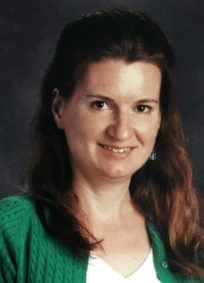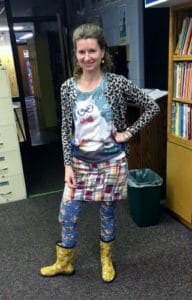 As a person with high-functioning autism, I have been blessed with the amazing opportunity to work with youth on the spectrum. I have worked for about 20 years as a teacher, if my volunteer teaching is included.
As a person with high-functioning autism, I have been blessed with the amazing opportunity to work with youth on the spectrum. I have worked for about 20 years as a teacher, if my volunteer teaching is included.
I have worked as a regular education teacher in high schools, as a community college instructor for filmmaking, as an inclusion teacher for most high school subjects, and as a resource for math. I have taught middle school math and science and English as a second language in Taiwan. I have been a tutor, life coach, and student teacher for residential treatment facilities.
Finding my home

Mary on Tacky Day at school
Some jobs were great, some were decent, and some were downright challenging. However, my recent placement has become home. I work at Lionheart Academy of the Triad, a private and growing school in Greensboro that offers specialized education to students on the spectrum. They receive the general education curriculum for grades middle to high school (also growing soon to elementary ages), but with additional learning in social and living skills that are often more difficult for people on the spectrum. In addition, students receive feedback with compassion and understanding because the staff are trained in autism. It has been remarkable to see the growth and change in the students. Because they receive the accommodations they need, they have made huge steps in learning, responsibility, and social skills.
I am very grateful to have found a place where I can give back to developing youth who experience difficulties I have faced. It is amazing to find that we are on the same wavelength at times. It is weird and magical to be able to get into the students’ heads and know where they are coming from when they show unexpected behaviors. They are like family. As a person with autism, this sort of work is a huge blessing.
Facing challenges
It can be challenging for adults with autism to find meaningful work, let alone work to support themselves. I had difficulty in work environments with hidden rules. People had expectations of me that I could not fulfill, because I did not know what they were, and sometimes, they did not know, either. People tend to learn expected behaviors from others through instinctual or innate means. For people with autism, there can be a block in reading other people and picking up on subtle cues.
Due to my limited abilities to read others, I ended up frustrating bosses and co-workers. I did not realize it, and thought it was others against me. I was bullied and outcast. I went on endless interviews (right out of college) and kept being turned down. I had attended a top university for film/television and expected a great if not decent job in that field in Los Angeles. It just did not make sense.
Receiving my diagnosis
Teaching seemed to be the area for me after I succeeded in teaching English as a second language in Taiwan. I had never thought I had autism until I pursued a master’s in special education and read about autism. I then received a diagnosis from the UNC TEACCH Autism Program. Prior to my diagnosis, pursuing meaningful work was a huge challenge. After diagnosis, it was still a challenge, but far more manageable. As the years passed, my awareness grew. I was more able to handle my challenges as well as find and express my gifts. I began to do quite well at work and to have many opportunities within work and around work. There were other jobs to pursue. There were people who needed my skills. That felt good.
Learning through failure
I occasionally check out the website for Wrong Planet (www.wrongplanet.com) to see what adults are experiencing when attempting gainful employment. Many of the comments are not positive. Adults seem to be having a lot of difficulty with large and small failures. The large failures include termination. The small ones include sensitivity to work environment, issues with coworkers, etc.
Failure is important. There really is no way to learn without trying and failing. Sometimes, more failures lead to more learning. The right attitude can turn failure into something fun and exciting to figure out. Instead of feeling dismay at the challenge of employment and self-sustenance, one should feel the thrill of a lifelong goal. We all have our goals. They are different for everyone. That is okay!!
Don’t give up
In addition, it is also okay to deal with other adults and peers who have no clue at what we are experiencing and feeling. It is okay to see people make odd faces when we have meltdowns. It is better to manage those feelings and meltdowns, so that we can enter society as functional and useful adults. It is one of the best feelings in the world… to feel useful and appreciated. If you want that feeling, and you do not have it, keep trying. You will get there! Have a sense of humor and fighting spirit about you while you continue to try and thrive. You. Can. Do. It.
Mary Janca was diagnosed with Autism Spectrum Disorder at 33 years of age after years of struggles, including trying to fit her unique self into various molds. She works as a high school teacher and coach for students who are of all learning and social abilities (including with ASD). She has a master’s in special education, a bachelor’s in film & anthropology, and teaching certifications in various subjects. She enjoys exercise, travel, learning, people, reading, and art.
Tags: ASNC, autism acceptance, autism advocacy, autism awareness, autism education, autism society north carolina, autism society of NC, Autism Society of North Carolina, Autism spectrum, Autism Spectrum Disorder, Autism Spectrum Disorders
